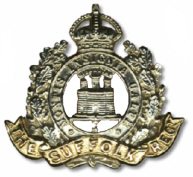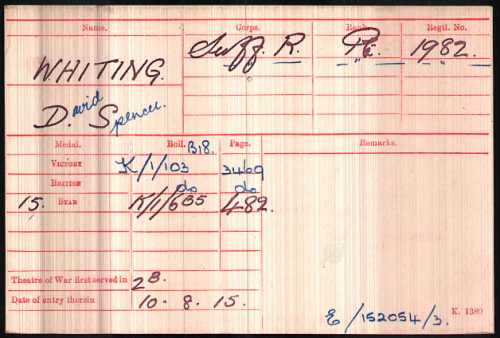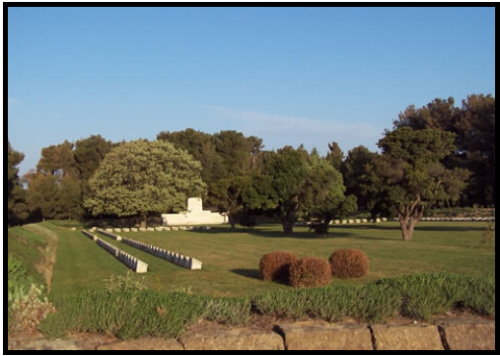



No. 1982, Private, David Spencer WHITING
Aged 23

|
David Spencer WHITING (known as Spencer) was born at 9 Duddery Road, Haverhill on 20th May 1892 (Risbridge Q2-1892 4A:707), baptised in St Mary's Haverhill on 15th January 1897,
the son of Frederick and Sarah Charlotte WHITING (née BACKLER).
The 1891 census has the family at 9 Duddery Road, and there were sisters Margaret Amy [11] and Esther Harriet [6]; brothers Charles William [8] and Ernest Albert [2], and a servant Mary Ann TAYLOR [27] 1901 census...Aged 8, he was at 9 Duddery Road, Haverhill with his father Frederick WHITING [56] tailor's cutter born Haverhill and his mother Sarah [51] born South Wales. Spencer was well known locally as at one time he was a purveyor of fish, delivering it by bicycle several days each week around the neighbouring villages. He also played football for Haverhill Rovers F.C. and was said to be a very smart forward with the Reserves. He was also frequently called upon to play for the Senior Eleven. 1911 census...Aged 19, as Spencer WHITING, an attendant, he was at 9 Bomore Road, Notting Hill, London with Harry Arthur and Annie TAYLOR and their children. He is recorded as a relative (Margaret Annie TAYLOR was his sister). His parents were still at 9 Duddery Road, with grand-daughter Maud TAYLOR [8] born Barking, Essex. His mother had borne 12 children but sadly, 7 had died . In late 1914 he married Ellen AMBROSE,[25-3-1893] a Haverhill girl living with her widowed mother ( father Frederick had been a mat maker) at 12 Waveney Terrace, Haverhill. This was in Colchester, where, it is assumed, he was serving in the Suffolk Regiment. Their daughter Olive Edith was born on 5-2-1916 in Haverhill at 12 Waveney Terrace, never to see her father. Sadly she died aged 9 in 1925. His widow re married in 1918 to William GARRARD (Tendring qtr 4 4a:1508). |

He enlisted in Haverhill (in the summer of 1914 judging by his regimental number). The 5th Suffolks embarked at Liverpool 30th July 1915 and went via Mudros to Gallipoli where they landed at Suvla Bay at 2pm on 10th August 1915 landed at Suvla Bay on 10 August 1915 and on 1st October were garrisoning NORFOLK TRENCH. The war diary for 29th-30th September has:- "During the hours of 18:30 and 19:30 on 29th inst.The ADJT (MAJOR LAWRENCE), CAPT. DENNIS and SEC LT. KILNER went out and collected from among unburied bodies of original landing force, 35 rifles. Casualties for 24 hours ending 19:00 today (30th) 3 wounded 1 seriously PTE WHITING. Sent to hospital 1 officer (CAPT. R M JACKSON) and 6 other ranks." The Cambridge Independent Press of 5th November 1915 reported :- Another Haverhill Footballer Killed Official intimation was received on Friday morning by Mrs. D.S.Whiting of Waveney Terrace, Haverhill, of the death of her husband,l Pte.D.S.Whiting. 1/5 Suffolk Regiment, he having died on October 1st from wounds received while serving with e British Med. E.F. Pte Whiting was well known locally. At one time he was a fish dealer, cycling with his wares several days a week into the neighbouring villages. He was only 23 years of age and was married just over a year ago. At the outbreak of war he was a member of the local Territorial Force, and was called up with them. "Speneye" as he was familiarly known, was well liked in all quarters. In the sporting world he was best known as a member of the Rovers F.C. He was a very smart forward while with the Reserves and was frequently of much service to the senior side. A letter home from David Spencer's friend Private E C Honeyball, who was also injured in this incident, described what had happened:- "I am in hospital wounded. I am feeling well in myself, my wounds are doing well, and there is nothing to worry about. I will tell you how it happened. S.Whiting of Haverhill and myself were sitting in a dug-out about ten yards behind the fire trench having our tea, when one of the Turks bombs dropped right in our dug-out, a piece going through my thigh, and other pieces hitting my wrist and shoulder. The two last named are nearly well and the thigh is doing well. I am sorry to say I think my chum S Whiting died in the night. I heard them say it was a hopeless case, and I heard he died." David had been seriously wounded by an exploding shell, and died the next day. It was not until a few months later that David's parents finally got to hear officially of how their son had met his fate, and a letter came to his father at Duddery Road from a Lieutenant of his company with more details:- "My first letter has apparently not reached you, and must have got lost on the way. I knew your son very well as he was my regimental scout , when I was in charge of that section, and I can tell you he was the best scout that I had, and always very reliable and willing. He was well liked by his comrades and much esteemed by the officers, and personally I was very fond of him and I regretted his loss. I found out details from the officer and NCO's who were on the spot; it was on 30th September last year and the company had been holding a certain trench. Pte Whiting had been washing quite a lot, taking advantage to do so as there was sometimes a shortage of water, and he remarked he must be the cleanest member of the regiment. He was under cover with some mates reading the papers which had just been distributed from headquarters, when a Turkish shell exploded near the dug-out. Pte Whiting was badly struck in the legs, his left leg being much injured, and was attended to at once by the medical officer who gave him morphia. He was most plucky about it, and as he was borne away on a stretcher he called to one of the regiment "Goodbye Quartermaster, I'll see you all soon." At the hospital it was found necessary to amputate the left leg, and after being given anaesthetic for the operation on 1st October, he did not come round again. He was buried in the hospital cemetery on the shore quite near Anzac, and marked with a wooden cross made by a comrade." Since he is named on a special memorial ("believed to be buried in this cemetery") it appears his actual grave was lost later. |


photo from www.anzac.govt.nz/gallipoliguide/image-pages/embarkation-pier
click here to go to the Commonwealth War Graves Commission website for full cemetery/memorial details